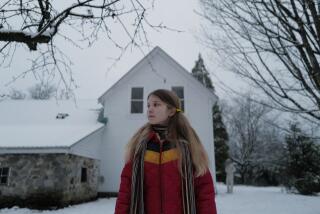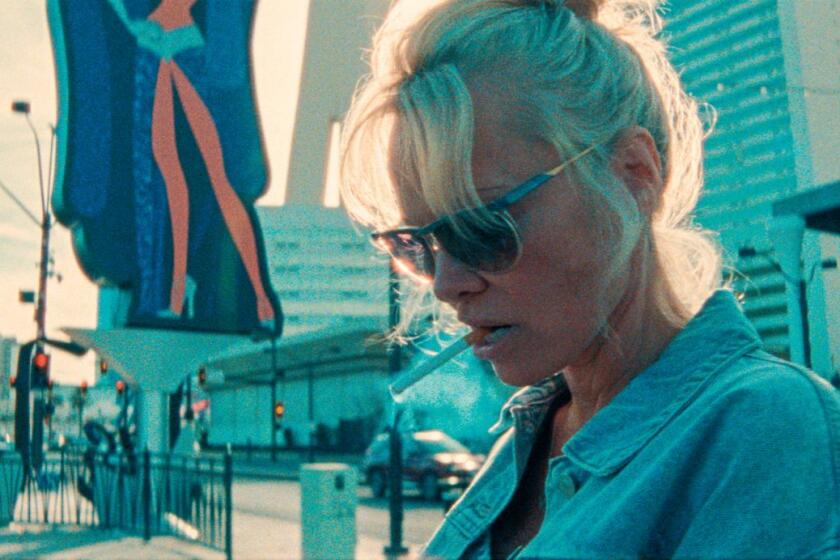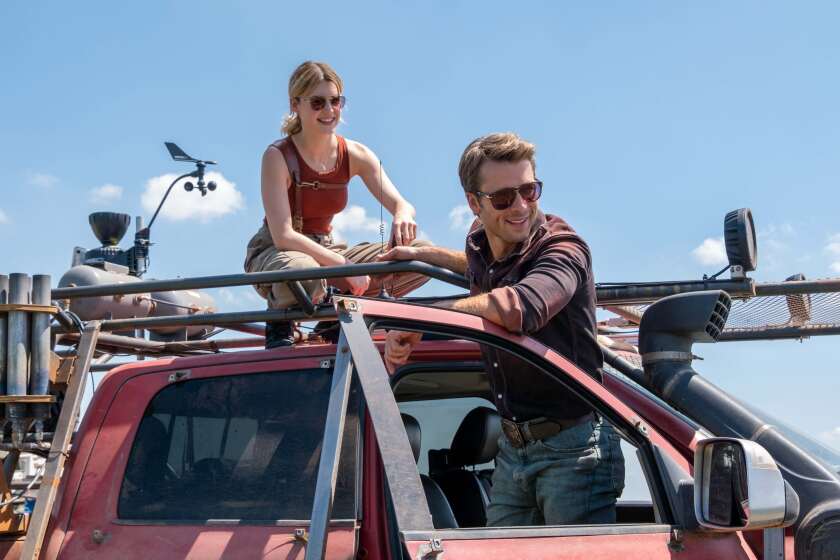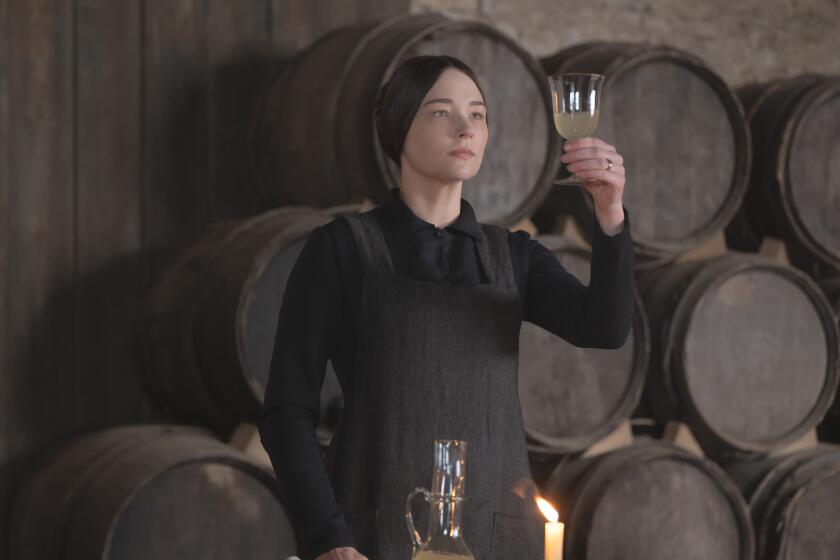BOOK EXCERPT : Withering ‘Heights’ : William Wyler’s romantic epic captivated audiences in 1939. But the real drama--starring the lead actors, Sam Goldwyn and Wyler’s own private life--was unfolding off-screen.
The following excerpt from “A Talent for Trouble: The Life of Hollywood’s Most Acclaimed Director, William Wyler,” to be published Jan. 3 by G.P. Putnam’s Sons, examines the making of one of Wyler’s most lauded films (and one of the most contentious behind the scenes), “Wuthering Heights.” Copyright 1996 G.P. Putnam’s Sons.
*
One day in the late 1970s, Steven Spielberg took a solitary walk along the surf in Malibu looking for a particular house. When he found it, he knocked and hoped he wasn’t presuming. The director he wanted to meet wasn’t expecting him.
William Wyler came to the door. He had tender eyes in a mischievous face. He recognized Spielberg at a glance. “Come on in,” he said, not missing a beat. “Let’s talk movies.”
The disarming welcome made Hollywood’s newest Wunderkind feel as though he had arrived by special invitation. Years later, when asked why of all directors he had sought out William Wyler, Spielberg replied: “He was the best on the beach. I asked him all the questions I possibly could.”
Regarded with only slight exaggeration as a man who couldn’t make a flop, Wyler was the quintessential director of filmdom’s golden age, an establishment star despite a lifelong talent for trouble that had Carl Laemmle, Samuel Goldwyn, Louis B. Mayer and Jack Warner gnashing their teeth. He was also Laurence Olivier’s mentor, the love of Bette Davis’ life, John Huston’s best friend, Lillian Hellman’s confidant, Audrey Hepburn’s discoverer and Barbra Streisand’s role model.
Wyler arrived in Hollywood in 1922, when he was 19. He often said he started out as an “assistant errand boy.” At Universal Pictures he began on the swing gang, sweeping sets at night. By 23 he made his first silent western--six westerns, in fact, in six weeks.
Thus launched, Wyler would make 32 silents and develop into a director with few equals. Many of his later pictures from the 1930s to the 1960s became touchstones for a generation--”Jezebel,” “The Letter” and “The Little Foxes,” all with Davis; “Dead End,” with Humphrey Bogart; “Wuthering Heights,” with Olivier; “Mrs. Miniver,” with Greer Garson; “The Best Years of Our Lives,” with Myrna Loy and Fredric March; “The Heiress,” with Olivia De Havilland and Montgomery Clift; “Roman Holiday,” with Gregory Peck and Hepburn; “Ben-Hur,” with Charlton Heston; and “Funny Girl,” with Streisand.
Wyler’s pictures won 38 Academy Awards, twice as many as any other director’s. Their 127 Oscar nominations--half of them in best picture, director and acting categories--are not remotely approached by the closest competition. And he himself won three.
In Hellman’s words, Wyler, who died in 1981, was “the greatest of all American directors.” Filmmakers as varied as Mike Nichols, Clint Eastwood and Martin Scorsese regard him with awe three quarters of a century after he came to Hollywood. “He brought the hard clarity of his vision to whatever he touched,” Scorsese says.
*
It was the spring of 1938. The country was still trying to recover, not too successfully, from the Great Depression. Wyler’s last four assignments--”These Three,” “Dodsworth,” “Dead End” and “Jezebel”--had solidified his reputation. His base salary came to $100,000 a year, the equivalent of more than a million in today’s dollars. Goldwyn nonetheless had two stinkers picked out for his ace director: “The Cowboy and the Lady” and “The Adventures of Marco Polo.”
The first, to star Gary Cooper and Merle Oberon, was a light comedy that Wyler disliked intensely. Not wanting to take a suspension, he pursued a new strategy to get out of the assignment: Accept it and work at a snail’s pace that was slow even for him. When Goldwyn saw the amount of footage from Wyler’s first three days on the job, he replaced him with H.C. Potter.
The second looked like another low-grade vehicle for Cooper. This time director and producer got into a shouting match. “I’m here to make good pictures,” Wyler insisted. “If I don’t see it, I won’t touch it. I may not make a good picture, but I still gotta believe in it!”
Goldwyn suspended him.
Wyler did have a script he wanted to direct: “Wuthering Heights,” based on Emily Bronte’s gothic novel about the doomed passion between Catherine Earnshaw and Heathcliff. Various stories have circulated as to how Wyler became interested in it. His own, repeated in one version or another, essentially contends that actress Sylvia Sidney tipped him off to Ben Hecht and Charles MacArthur’s screen adaptation.
“During ‘Dead End,’ Sylvia Sidney told me there was a very good script of ‘Wuthering Heights,’ ” Wyler maintained. “It was for her and Charles Boyer. They were both under contract to Walter Wanger, who owned the property. But she said she wasn’t going to do it, because it wasn’t right for her or for Boyer either. She asked if I wanted to read it. It was a marvelous script. I took it to Goldwyn. He didn’t want to do it. He didn’t like stories with people dying at the end. I told him it was a great love story.”
After making “Jezebel,” when their affair began, Wyler and Davis wanted to do another picture together. “She asked me if I knew of anything,” he recalled. “Although I didn’t think she was right for it, I gave her the script. She loved it. She took it to Jack Warner and asked him to buy it. But my loyalty to Goldwyn got the best of me because, after all, I was under contract to him.
“I went back to Goldwyn and told him what had happened. I told him Bette wanted to do it and Warner was going to buy it. Well, he said, ‘Can Merle do it?’ I said, ‘Of course.’ He was looking for a picture for Merle Oberon, so he stepped in and bought it.”
When Sidney was asked in 1990 about this story, her reply was: “Total lie. First of all, my relationship with Wyler was so weird I wouldn’t have opened my mouth to him about anything. Second of all, I was dying to do it. What happened was the script was bought by Wanger for me and Charles Boyer, but I’d had a terrible fight with Wanger because I refused to do ‘Algiers.’ So he turned around and sold the script to Goldwyn.”
Whether Sidney gave the script to Wyler, who took it to Goldwyn, or Wanger sold it to Goldwyn to spite Sidney remains unclear. Whether Wyler let his loyalty to Goldwyn take over or, as legend has it, connived with Davis to interest Warner as a ruse to draw Goldwyn in also can’t be settled. But nobody disputes the fact that Wyler persuaded Goldwyn to buy the rights or that Goldwyn did so with great reluctance.
In June 1938, Wyler sailed for Europe on the Normandie with a twofold objective--to select a British cast for “Wuthering Heights” and to acquaint himself with Yorkshire’s wind-swept moors, where Bronte’s novel is set.
*
Although director and producer had yet to settle their differences over what changes needed to be made in the script, they both agreed the picture required a British cast. For the role of Heathcliff, Ben Hecht had suggested seasoned stage actor Laurence Olivier. Wyler thought him a great choice. In 1934 he had caught Olivier’s Broadway debut in Mordaunt Shairp’s “The Green Bay Tree,” a dark and puzzling drama about a homosexual relationship that left audiences astonished.
Olivier was still relatively unknown in America, but Wyler thought that all to the good. When he arrived in London to offer the young actor the “plum” role, however, Olivier was nowhere to be found. He had gone to the South of France with his lover, Vivien Leigh, in her old Ford V-8.
With the help of Alexander Korda’s casting director, Wyler got a thorough look at the current crop of English actors. He made his selections, only to discover later that Goldwyn changed his mind and would not consider the added expense of importing actors for secondary roles. The search turned up Robert Newton, though, a young actor with a thundering voice and a wild look in his eyes. Wyler arranged a screen test to see if Newton was suitable for Heathcliff as an alternative to Olivier.
It seemed possible that Olivier might not be available or even interested in the role. His first experience in Hollywood in the early ‘30s had ended disastrously when Greta Garbo refused to accept him as her leading man in “Queen Christina.” Unhappy with his treatment, Olivier had gone back to England with small faith in movies and no desire at all to return to Hollywood.
Wyler reached Olivier by cable: “Are you interested Goldwyn idea for Vivien yourself and Oberon in Wuthering Heights? Answer as soon as possible.” Olivier was in no hurry either to reply or to rush home from the French countryside. It took him several weeks to wire back a rather noncommittal response: “Have been motoring on Continent thanks your interest and kindness. . . . Hope to see you before your return.”
Hearing that Olivier would not be back in London before early August, Wyler headed to the South of France himself. He and Olivier finally met at the actor’s London home in Christchurch Street. The actor was not keen on accepting the role if it meant a separation from Leigh, whom he’d met the year before while making the British film “Fire Over England.” Their adulterous affair had stirred a huge sensation in the British press. Olivier was worried that if he left Leigh she might be persuaded to go back to her husband and daughter. He also had disdain not just for Hollywood but for the notion that movies could compete with the high art of the theater. For Olivier, the stage was a calling. Movies were, at best, a career.
“I presented what I considered a plum part for any actor, particularly for one who was relatively unknown in America,” Wyler recalled. “But Mr. Olivier was less than enthusiastic, though he agreed that it was a good script and that Heathcliff was a good role.”
At first, nothing Wyler said could get a commitment from Olivier. It was only after the actor took him to see the premiere of “St. Martin’s Lane,” which starred Charles Laughton and Leigh, that Wyler realized what Olivier was really angling for: He wanted a solid offer for Leigh to play Cathy, not just some vague “Goldwyn idea” that she would be in the picture too. Wyler knew there was no way that could be arranged but thought he had the perfect compromise. He offered her Isabella, the second female lead.
“She immediately rejected the offer,” Wyler said. “I told her Merle Oberon had the part, that Merle was the reason Goldwyn was making the picture. She said she still didn’t want [Isabella]. Now I was back to square one.
“Thinking Larry wouldn’t come unless they came together, I made another attempt to convince her. I said, ‘Look, Vivien, you’re unknown in America. You may become a big star, but for a first part you’ll never get better than Isabella. Never.’ I guess she showed me--six months later, she had the role of Scarlett in ‘Gone With the Wind.’ ”
Olivier finally changed his mind. In his memoir “On Acting,” he recounts: “I went to see [Wyler’s] current success, ‘Jezebel,’ and realized that he had a telling way with a camera and with dialogue. Vivien saw that I liked Wyler, liked the part of Heathcliff, and persuaded me.”
Happy to have the answer he’d come for, Wyler sailed home from London on Sept. 1. The day before he left, he received a letter from Leigh that she might well accept the role of Isabella after all: “Would it be possible to let you know definitely in two weeks or so? This is not because I am still fencing about the part, but purely because it is only fair to my theater management to wait and see. Subject to the usual conditions, which can be negotiated in the meantime, I shall be very happy to play Isabella for you.”
Olivier caught the Normandie bound for New York on Nov. 5, Vivien’s 25th birthday. She stayed behind but three weeks later could no longer bear their separation. On an impulse she booked passage on the Queen Mary and sailed for New York herself, then took a plane to Los Angeles. No deal was ever made for her to play Isabella; Goldwyn decided her price was too steep. A month later, on Christmas Day, she snared the role of Scarlett O’Hara. Olivier had introduced her to agent Myron Selznick. He in turn had brought her to the set of “Gone With the Wind” in Culver City, where his brother David O. Selznick was supervising the spectacular burning of Atlanta.
Director George Cukor, later replaced by Victor Fleming, tested her the following week. Candidates for the role had been narrowed down to Paulette Goddard, Jean Arthur and Joan Bennett. But it would be no contest. Selznick knew the outcome in advance. “Shhhhh,” he memoed his wife. “She’s the Scarlett dark horse.”
Hecht and MacArthur had performed major surgery on Emily Bronte’s novel, lopping off its entire second half and narrowing a multi-generational epic to the climactic tale of Heathcliff and Cathy. Wyler admired the script’s efficiency. Nevertheless, he wanted John Huston to tinker with it and asked Goldwyn to hire him. Hecht and MacArthur had written “a beautiful screenplay, but it was almost in treatment form,” Huston recalled.
Wyler got his wish. Then producer, director and writer met for story conferences. “There would be great arguments between Willy and Sam,” Huston recounted. “Sam’s voice would go up in pitch. Willy, not to be intimidated, would go an octave higher.”
The filming of “Wuthering Heights” began in early December 1938 and was by most accounts a less than serene experience. In Chatsworth, among the hills of the San Fernando Valley, the location was stripped of its natural vegetation. Tumbleweed was brought in and topped with sawdust to create the illusion of heather. A thousand genuine heather plants were planted for close-ups. Unused to California sunshine, the heather grew so tall that within a week it no longer resembled anything seen on a Yorkshire moor.
Feelings between Merle Oberon and Laurence Olivier were far from congenial. They had gotten along the year before when making “The Divorce of Lady X” in Britain. But Olivier did not think much of her acting abilities then, and they irked him now. Also, he said years later, “she may have thought that I looked upon her as a little pickup by Korda, which she was.”
Oberon grumbled about their love scenes. She stopped one in the middle of a take. “You know, you spat at me,” she said. “You had a drop of spittle come flying across in your goddamned passion. You spat, and it hit me.”
“Oh, Merle, I beg your pardon,” Olivier said testily. “But these things do happen between actors.”
On the retake Oberon lost her temper.
“That was worse than anything I’ve ever seen in my life,” she snapped. “I don’t think I’ve ever seen such a badly played shot if I may say so--and you spat again!”
“Why you amateur little bitch,” Olivier fumed. “What’s a little spit for crissake between actors? You bloody little idiot, how dare you speak to me. . . .”
Before he could finish, Oberon fled in tears.
Wyler lost his patience. “Go on after her and make it up,” he said.
“No, sir,” Olivier told him. “I [won’t] be insulted by snippets like that.”
Wyler insisted on the apology. Olivier sulked.
“I was abominably pompous with Wyler, who detested me quite rightly,” he recalled. “I was so goddamned conceited. I thought I was the cat’s whiskers. I thought I knew all about everything to do with the art or the craft. Well, I didn’t. But that didn’t stop me thinking so, and it took Wyler to bully that out of me.”
At first, Olivier considered the director vicious and cruel. He couldn’t understand his method of doing take after take without communicating what it was he wanted. When Olivier asked him to explain, Wyler typically cut him off with a curt reply. “It’s just lousy. Do it again.”
Olivier finally couldn’t bear doing another retake. He went up to Wyler and confronted him.
“For God’s sake, I did it standing up. I did it sitting down. I did it fast. I did it slow. I did it with a smile. I did it with a smirk. I did it scratching my ear. I did it with my back to the camera. How do you want me to do it?”
Wyler stared at him, bemused.
“I want it better.”
Wyler was, in Olivier’s words, “a marvelous sneerer” whose demand for the truth could humiliate. If his critiques were short and to the point, they were not less devastating for their brevity. Once he gave the star a dressing-down in front of the entire cast and crew.
“I was overacting appallingly and doing some extravagant gestures,” Olivier said. “Wyler stopped me and said, ‘For crissake, what do you think you’re doing? Do you think you’re at the Opera House in Manchester? Come down to earth. I don’t want a “great performance.” Tell me, Larry, what dimension do you reckon you’ve got to now?’ ”
In front of everybody Olivier heard himself say, “I suppose this anemic little medium can’t take great acting.” As soon as he said it, he regretted it. Laughter rolled from the gantries. The entire crew was vastly amused.
“I thought Willy would never stop laughing,” Olivier remembered. “He bawled me out and made me feel a jackass. He was right. I was a fool, a stupid, conceited, pompous little bastard.”
Nervous about the commercial possibilities of a brooding and gloomy love story, Goldwyn kept a close watch on production with frequent visits to the set. He examined the dailies with an eye toward the amount of footage Wyler was using. He worried over the performances. He could see that Oberon was in over her head and that Olivier was mugging. He disliked Olivier’s makeup. It made him look as though he’d been rolling around in the mud. With all this on his mind, Goldwyn went to the set one morning ready to burst.
Olivier had been limping around on crutches with a bad case of athlete’s foot. When Goldwyn came to confer with Wyler, the star thought he could appeal to the producer’s sympathy for a day off.
“I couldn’t put any shoes on at all,” Olivier recounted. “I had to wrap my feet round with bandages and simply hobble about. I thought if I went up to him, Goldwyn would hold out his arm and say, ‘Willy, you must send this poor unfortunate fellow home. He looks dreadfully tired. We’ve got to rest him now.’
“Sure enough, as I approached him, he held his arm out and I put my shoulder underneath his hand where it rested. And he said: ‘Will you look at his ugly face? He’s dirty! His performance is rotten! It’s stagy! I won’t have it, and if he doesn’t improve I’m gonna close up the picture.’ ”
Olivier was shocked. Goldwyn seemed to be working himself into a tirade.
Wyler didn’t bat an eye. “He’s playing a stable boy,” he said. “What did you expect? A choir boy?”
Goldwyn had no answer for that.
“He’s a stable boy who lives in a barn,” Wyler went on. “He takes care of the horses. He shovels manure. He can’t be clean. Wait till he goes to America and comes back rich. He’ll look very clean.”
Olivier’s relationship with Wyler turned a corner after that. The director invited the actor home, where they talked seriously about film. Wyler tried to convince Olivier of its unlimited artistic potential.
Wyler’s respect for the medium changed Olivier’s outlook.
“If any film actor is having trouble with his career, can’t master the medium and, anyway, wonders whether it’s worth it,” Olivier said later, “let him pray to meet a man like Wyler.”
Willy rarely brought his work home with him. But “Wuthering Heights” was an exception. Wyler’s wife, Margaret Tallichet, or Talli for short (whom he had married in 1938 after his affair with Davis), remembered “Willy thrashing around in his sleep over it.” When she would ask him the next morning if he’d had bad dreams, he would tell her: “I was arguing with Goldwyn.”
Relations between Wyler and Goldwyn were particularly heated over their differences about the ending of the picture. Cathy and Heathcliff don’t just fail to connect. During Cathy’s death scene, both of them know they’ve botched their lives. Years later, Heathcliff disappears in a storm, seeking her ghost. Goldwyn wanted Wyler to create the illusion of a happy ending by resurrecting them, if only momentarily, and having them walk off into the proverbial sunset.
“He didn’t want to look at a corpse at the fade-out,” Wyler said. “So he asked me to make a shot of them walking hand in hand through the clouds to show that they were together in heaven. I told him there was no way I would shoot it.”
Undeterred, Goldwyn ordered H.C. Potter to do it. Potter used a pair of doubles for Olivier and Oberon. They are seen from the back climbing upward together along their favorite path, toy figures superimposed in the sky.
“Wuthering Heights” opened on April 13, 1939, at the Rivoli in New York and the Pantages in Hollywood. The New York reviewers gushed: “brilliant and bold” (Archer Winsten in the Post), “marked by a rare integrity” (Howard Barnes in the Herald-Tribune), “a thing of beauty that will remain forever” (the pseudonymous Kate Cameron in the Daily News).
The film was nominated for eight Oscars, though it won only for Gregg Toland’s black-and-white cinematography. “Gone With the Wind” took the Oscar for best picture that year. But “Wuthering Heights” turned Olivier into a matinee idol, and it won the New York Film Critics Award. Goldwyn took such enormous pride in the picture that he proclaimed it his own greatest achievement.
“I made it,” he insisted. “Wyler only directed it.”
When Goldwyn threw a dinner party for the Hollywood premiere, he invited Eleanor Roosevelt, Irving Berlin, Norma Shearer and Merle Oberon, among a few others, but not his star director. Wyler was miffed but also amused. He knew why he hadn’t received an invitation.
“It griped Goldwyn that the story got around about how much trouble I had selling him the idea.”
Goldwyn didn’t invite his star director to the New York premiere of “Wuthering Heights” or to that opening-night party, either.
“I came to New York anyway,” Wyler recounted. “When Goldwyn saw me, he asked: ‘What are you doing here?’ ”
More to Read
Only good movies
Get the Indie Focus newsletter, Mark Olsen's weekly guide to the world of cinema.
You may occasionally receive promotional content from the Los Angeles Times.






